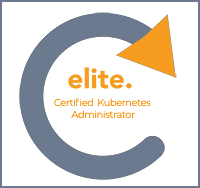Course Description
This class prepares students for the Certified Kubernetes Administrator (CKA) exam. Kubernetes is a Cloud Orchestration Platform providing reliability, replication, and stability while maximizing resource utilization for applications and services. By the conclusion of this hands-on, vendor-agnostic training, you will go back to work with the knowledge, skills, and abilities to design, implement, and maintain a production-grade Kubernetes cluster. We prioritize covering all objectives and concepts necessary for passing the Certified Kubernetes Administrator (CKA) exam. You will be provided with the components necessary to assemble your own high-availability Kubernetes environment and configure, expand, and control it to meet the demands of cluster administrators. Your week of intensive, hands-on training will conclude with a mock CKA exam that simulates the actual exam.
Target Student
- Professionals who need to maintain or set up a Kubernetes cluster
- Container Orchestration Engineers
- DevOps Professionals
Course Objectives
- Cluster architecture, installation, and configuration
- Rolling out and rolling back applications in production
- Scaling clusters and applications to best use
- How to create robust, self-healing deployments
- Networking configuration on cluster nodes, services, and CoreDNS
- Persistent and intelligent storage for applications
- Troubleshooting cluster, application, and user errors
- Vendor-agnostic cloud provider-based Kubernetes
- AI LLM prompt engineering for generating configuration snippets and solutions
Course Content
Cluster Architecture
- Lecture: Kubernetes Architecture
- Lecture: Pods and the Control Plane
Installation
- Lecture: Kubeadm Prerequisites
- Lecture + Lab: Kubeadm Prerequisites
- Lecture: Configure Network Plugin Requirements
- Lecture + Lab: Configure Network Plugin Requirements
- Lecture: Kubeadm Basic Cluster
- Lecture + Lab: Installing Kubeadm
- Lecture: Join Node to Cluster
- Lecture + Lab: Join Node to Cluster
Cluster Administration
- Lecture: ETCD Snapshot and Restore
- Lecture + Lab: ETCD Snapshot and Restore
- Lecture: Kubeadm Cluster Upgrade
- Lecture + Lab: Kubeadm cluster upgrade
- Lecture: Purge Kubeadm
- Lecture + Lab: Purge Kubeadm
- Lecture: Kubernetes the Alta3 Way
- Lecture + Lab: Deploy Kubernetes using Ansible
Containers
- Lecture: Container Essentials
- Lecture + Lab: Creating a Docker Image
Pod Basics
- Lecture: YAML
- Lecture: Manifests
- Lecture + Lab: Basic Pods
- Lecture: Namespaces
- Lecture + Lab: Namespaces
- Lecture: API Versioning and Deprecations
Kubectl
- Lecture: Kubectl get and sorting
- Lecture + Lab: kubectl get
Resource Management
- Lecture + Lab: Kubectl Top and Application Monitoring
- Lecture: Limits, Requests, and Namespace ResourceQuotas
- Lecture + Lab: Resource Requests and Limits
- Lecture + Lab: Namespace Resource Quota
- Lecture: Admission Controller
- Lecture + Lab: Create a LimitRange AdmissionController
User Administration
- Lecture: Contexts
- Lecture + Lab: Contexts
- Lecture: Role-Based Access Control
- Lecture + Lab: Role-Based Access Control
- Lecture + Lab: RBAC Distributing Access
Advanced Pod Design
- Lecture: Readiness and Liveness Probes
- Lecture + Lab: Implement Probes and Health Checks
- Lecture: ConfigMaps and Volume Mounting
- Lecture + Lab: Persistent Configuration with ConfigMaps
- Lecture: Secrets
- Lecture + Lab: Create and Consume Secrets
- Lecture: Multi-Container Pods
- Lecture + Lab: Creating Ephemeral Storage For Fluentd Logging Sidecar
- Lecture: Init Containers
- Lecture + Lab: Understand the Init Container Multi-Container Pod Design Pattern
- Lecture: Taints, Tolerations, and Pod Affinity
- Lecture + Lab: Tainted Nodes and Tolerations
Logging
- Lecture: Logging with kubectl log
- Lecture + Lab: Utilize Container Logs
- Lecture: Advanced Logging Techniques
Labels
- Lecture: Labels
- Lecture + Lab: Labels and Selectors
- Lecture: Annotations
- Lecture + Lab: Insert an Annotation
Replica and Daemon Sets
- Lecture: ReplicaSets
- Lecture + Lab: Create and Configure a ReplicaSet
- Lecture: DaemonSets
Deployments
- Lecture: Deployments - Purpose and Advantages
- Lecture + Lab: Writing a Deployment Manifest
- Lecture: Deployments - Version Control
- Lecture + Lab: Performing Rolling Updates and Rollbacks with Deployments
- Lecture: Blue/Green and Canary Deployment Strategies
- Lecture + Lab: Advanced Deployment Strategies
- Lecture: Deployments - Horizontal Scaling
- Challenge: Horizontal Pod Autoscaling
Persistent Storage
- Lecture: Persistent Volumes, Claims, and StorageClasses
- Lecture + Lab: Using PersistentVolumeClaims for Storage
- Lecture: PVC, PV, and StorageClass config
- Lecture + Lab: Persistent Storage with NFS
Services & Networking
- Lecture: NetworkPolicy
- Lecture + Lab: Deploy a NetworkPolicy
- Lecture + Lab: Namespace Network Policy
- Lecture: Services - LoadBalancer, NodePort, and ClusterIP
- Lecture + Lab: Access to applications via services
- Lecture: Networking Plugins
- Lecture: Ingress Controllers
- Lecture + Lab: Ingress Controllers Expose a Service
DNS
- Lecture: Hostnames and FQDNs
- Lecture + Lab: Hostnames and FQDNs
- Lecture: CoreDNS
- Lecture + Lab: Install CoreDNS
- Lecture: Configure CoreDNS
- Lecture + Lab: Configure CoreDNS
- Lecture + Lab: Revert CoreDNS to KubeDNS

